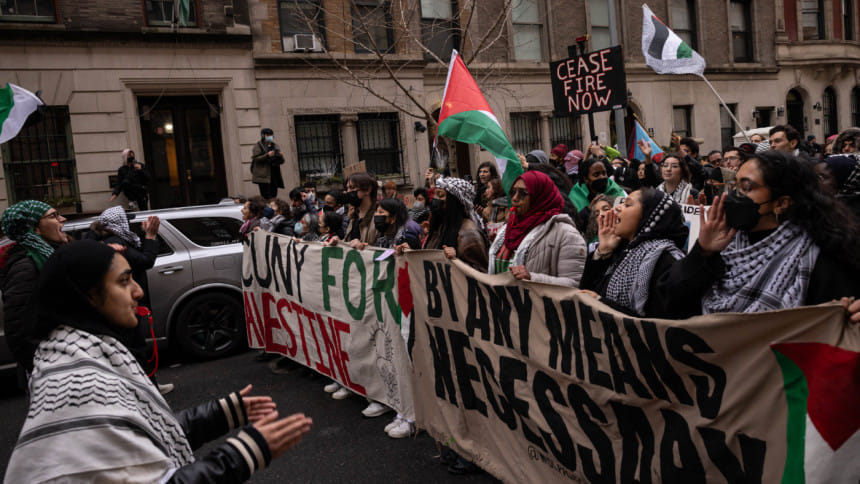Israel says studying Hamas response to truce deal
Israel on Tuesday said it was examining Hamas’s response to a plan to halt nearly four months of fighting in Gaza, after key mediator Qatar said the Palestinian group had given a “positive” reply to the proposed agreement.
US Secretary of State Antony Blinken, on his fifth tour of the region since the war broke out in October, arrived in Israel to discuss what he called an “essential” agreement.
“We have received a reply from Hamas with regards to the general framework of the agreement with regards to hostages,” Qatari Prime Minister Mohammed bin Abdulrahman Al-Thani said after meeting Blinken in Doha.
“The reply includes some comments, but in general it is positive.”
Hamas confirmed it delivered its response to proposals hammered out a week ago in Paris between Qatar and other mediators.
Blinken said Hamas’s reply had been “shared” with Israel and he would discuss it there on Wednesday.
“We’re studying it intensely… and we will be working as hard as we possibly can to try to get an agreement,” he said.
Israel’s spy agency Mossad also received the Hamas response, the prime minister’s office said, and “its details are being thoroughly evaluated”.
Prime Minister Benjamin Netanyahu has yet to comment directly on the response but said on Tuesday: “We are on the way to the total victory and we will not stop. This position represents the overwhelming majority of the people.”
Fighting rages
The war started with unprecedented Hamas attacks on Israel on October 7, which resulted in the deaths of about 1,160 people, mostly civilians, according to an AFP tally based on official Israeli figures.
Militants also seized around 250 hostages. Israel says 132 remain in Gaza, including 29 who are believed to have been killed.
Vowing to eliminate Hamas, Israel has launched air strikes and a land offensive that have killed at least 27,585 people in Gaza, mostly women and children, according to the health ministry in the Hamas-run territory.
The United Nations, rights groups and charities have deplored the “catastrophic” humanitarian situation in the Gaza Strip.
Israel’s campaign has devastated swathes of Gaza, destroyed hospitals and displaced half of its population of 2.4 million, while food, water, fuel and medicine are in dire shortage.
Heavy strikes and fighting continued on Tuesday, with Gaza’s health ministry saying at least 107 people were killed in 24 hours, including six policemen securing an aid truck.
Fears have mounted for more than a million Palestinians sheltering in the far southern city of Rafah, after Israeli warnings it was the next target of its campaign to eradicate Hamas.
The army “will reach places where we have not yet fought… right up to the last Hamas bastion, which is Rafah”, Israeli Defence Minister Yoav Gallant said on Monday.
Safia Marouf, who sought refuge in Rafah with her family after being uprooted from their home further north, said she was afraid of what is to come.
“The children are scared all the time, and if we want to leave Rafah, we don’t know where to go. What will be our destiny and that of our children?”
Diplomatic push
Blinken met Qatari leaders on Tuesday after stops in Saudi Arabia and Egypt.
“There’s still a lot of work to be done,” Blinken said in Doha after being informed of Hamas’s reply.
“But we continue to believe that an agreement is possible and indeed essential,” he said.
The Qatari premier said he was “optimistic” but declined to discuss the Hamas reply in detail, citing the “sensitivity of the circumstances”.
Last week, a Hamas source said the truce deal calls for a six-week pause to fighting as Hamas frees hostages in exchange for Palestinian prisoners held by Israel and more aid for Gaza.
On Monday, Netanyahu said Hamas had presented “demands that we will not accept” for an exchange involving thousands of prisoners.
The Israeli leader is under pressure to end the war and bring the hostages home, amid divisions within his cabinet and public fury over the fate of the remaining captives.
Israeli troops, with air and naval support, have been engaged in heavy combat centred on Gaza’s main southern city of Khan Yunis, the hometown of Hamas’s Gaza chief, Yahya Sinwar, accused by Israel of masterminding the October 7 attack.
The army on Tuesday said that “over the past day, dozens of terrorists have been killed” and around 80 people were arrested.
“The humanitarian situation in the Gaza Strip is beyond catastrophic,” said Tommaso Della Longa, spokesman for the International Federation of Red Cross and Red Crescent Societies.
Around 8,000 displaced people had been evacuated from the besieged Al-Amal hospital in Khan Yunis, where they had sought refuge, after weeks of heavy shelling and fighting nearby, he added.
Lebanon strikes
The United States has strongly backed Israel with munitions and diplomatic support but also urged steps to reduce civilian casualties.
As the Gaza war has raged, violence has also flared in Lebanon, Iraq, Syria and Yemen, where Iran-backed groups have launched attacks in support of Hamas, triggering counterattacks by Israel, the United States and its partners.
The Israeli army said on Tuesday that strikes from Lebanon lightly wounded two soldiers and that it retaliated with artillery fire.
Its fighter jets had also targeted bases of the Iran-backed Hezbollah movement near Marwahin and Meiss El Jabal in southern Lebanon.
Yemen’s Iran-backed Huthis have for weeks been targeting what they say are Israel-linked ships in the Red Sea and Gulf of Aden in solidarity with Palestinians.
The attacks have disrupted global trade and prompted reprisals by US and British forces, including strikes on two “explosive-laden drone boats” on Monday, according to the US military.
The Huthis on Tuesday said they had struck US and British commercial ships in two separate attacks.
LondonGBDESK//



Comments are closed.